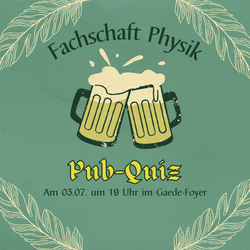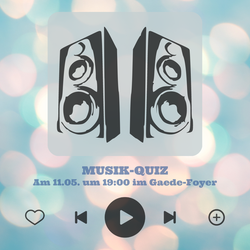Calendar
Past Events
For the last time this semester we invite you to a Rocket Science lecture.
Prof. Ritter will give you an insight into the world of geophysics.
The interior of the earth is not directly accessible to us humans. Therefore, we use physical methods to make processes visible there. For example, we measure the smallest ground motions of earthquake waves in field experiments in order to then localize their source and determine the source mechanism. For some years now, we have found evidence that magmatic fluids rise from the earth's mantle to the upper crust at a depth of about 45 km beneath the Laacher See volcano in the Eifel region. A large volcanic eruption took place there about 13,000 years ago, leaving a crater about 1.5 km wide, and its ash deposits are found in large parts of Europe.
The lecture will be held in German only.
(Note that the lecture will be held in German only)
The next lecture is coming up. This time Prof. Husemann from ETP will tell us something about his research.
How does our world work on the smallest scale and which particles and forces are responsible for it? To answer these fundamental questions about nature, researchers are conducting huge experiments at particle accelerators, for example at CERN near Geneva. In the lecture "Rocket Science in the Tunnel: Experiments in Particle Physics" you will not only learn how these experiments work, but also how your studies prepare you for research in particle physics.
We are looking forward to your coming!
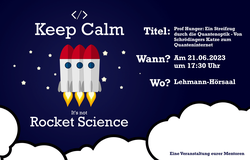
Ein Streifzug durch die Quantenoptik
von Schrödingers Katze zum Quanteninternet
Der nächste Vortrag in diesem Semester steht an.
Prof. Hunger wird euch über seine Forschung erzählen.
Licht verhält sich gleichzeitig als Welle und als Teilchen, und war dadurch ein Auslöser zur Entwicklung der Quantenphysik. In den letzten zwei Jahrzehnten konnte die Grundlagenforschung eindrucksvolle Fortschritte in der Kontrolle von Licht und seiner Wechselwirkung mit Materie auf Quantenebene erreichen. Nun beginnt man die gewonnenen Erkenntnisse für Anwendungen zu nutzen: Einzelne Lichtquanten ermöglichen absolut abhörsichere Kommunikation, über Licht verschränkte atomare Quantenbits könnten künftig ein Quanteninternet ermöglichen, in dem z.B. Quantencomputer und Quantensensoren vernetzt werden. Der Vortrag gibt einen Einblick in diese sogenannte 2. Quantenrevolution.
The second talk in the series "It's not Rocket Science" in the summer term 2023. The talks are only held in German.
More details can be found on the German page.
It‘s not Rocket Science - Unveiling of the universes secrets: The fascinating world of Higgs physics
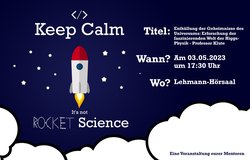
The first talk in the series "It's not Rocket Science" in the summer term 2023. The talks are only held in German.
On 01 April 2023 (for the summer term 2023) the reform of the Bachelor of Science Physics will be introduced. This will lead to changes in the curriculum and the admission requirements of exams.
For this occasion, the physics student council offers an information event where all changes will be presented and there will be time for questions. This event is intended for all students of the B. Sc. Physics, regardless of the number of semesters.
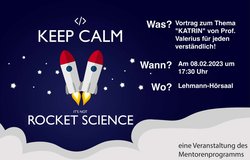
Am kommenden Mittwoch, den 08.02. geht die Vortragsreihe „It‘s not Rocket Science“ in die letzte Runde für dieses Semester! Professorin Valerius wird uns in einem für alle verständlichen Vortrag etwas über ihr Forschungsgebiet erzählen:
Kosmischen Leichtgewichten auf der Spur: Neutrinos auf der Waagschale von KATRIN
Neutrinos - das sind nicht nur die leichtesten Elementarteilchen, die wir kennen, sondern auch „kosmische Architekten“, die seit dem Urknall unser Universum mit geprägt haben. Viele Eigenschaften der Neutrinos sind uns auch fast 100 Jahre nach deren Einzug in die Teilchenphysik noch unbekannt. So wissen wir beispielsweise über ihre Masse bisher nur, dass sie mindestens eine Million mal kleiner ist als die der nächstleichtesten Teilchen, der Elektronen.
Mit dem KATRIN-Experiment am Campus Nord des KIT wollen Forscherinnen und Forscher nun die Neutrinomasse messen und damit eine wichtige offene Frage der modernen Teilchenphysik und Kosmologie beantworten. In diesem Vortrag möchte ich die Messmethode erklären, mit der …
